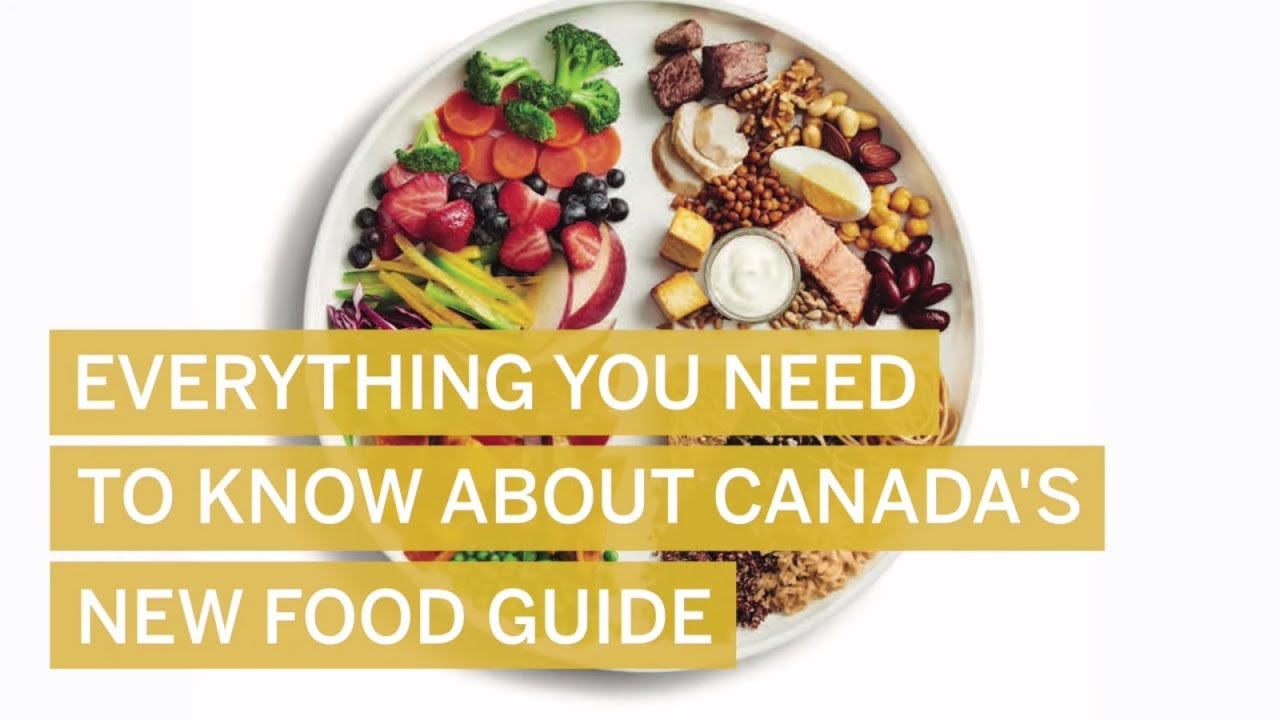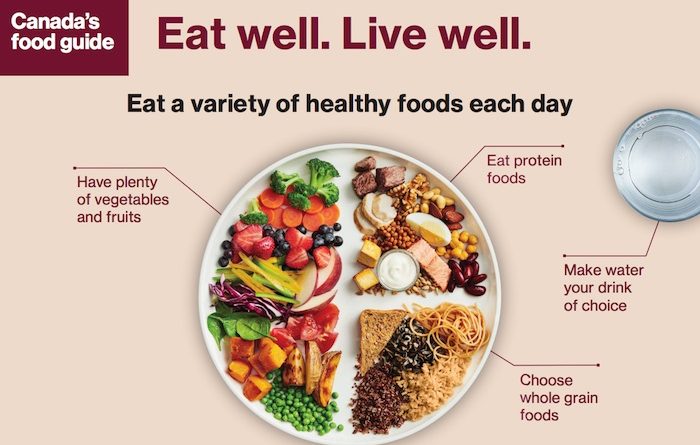
Tips & Tools
Managing your anxiety
Canada's Food Guide: What it Means for You!

After more than a decade, Canada’s Food Guide has received an overhaul!
Goodbye dairy and specific serving sizes and hello plant-based proteins and mindful portion control!

We are thrilled that the Canadian Government has finally removed the outdated rainbow, and replaced it with a vibrant, nutritious plate covered in fruits and vegetables, whole grains, and proteins.
While you can read all the details on their website, we thought we would give you a brief overview of the main changes and what they mean for your mental health.
1. Our 4 Major Food Groups Have Been Reduced to 3
That’s right, no more dairy as its own food group. As dairy is one of the most problematic foods when it comes to proper digestion, this removal is excellent progress. As we have stated many times, what we feed our gut directly impacts our brains. So for those who cannot properly digest dairy, having it as a main food group poses as a conflict.
This is not to say they have removed dairy all together, and rightfully so. They simply added it to the protein category, providing it as an OPTION to consume, not a mandatory item. Dairy is a good source of protein and healthy fats so for those of you who can digest it properly, it is a great option to consider. Especially fermented dairy, which are rich in healthy bacteria and probiotics.
2. Consider Plant-Based Proteins
Along with adding dairy as a protein option, Canada’s Food Guide have also emphasized including plant-based proteins into your diet. While animal proteins are great, including more plant-based options helps heal our environment, while still satisfying the protein intake requirements. Plus, plant-based proteins can provide more fibre and less saturated fat than other types of protein foods, which is great for out gut.
Learn what healthy plant-protein options they suggest here.
3. Drink WATER with Meals Not Milk, Juice, Alcohol, or Caffeine-Based Beverages
Gone are the days when milk is the preferred choice for your dinnertime beverage. Similarly, fruit juices are (finally) removed as a healthy source of fruits and vegetables. As we have mentioned before, caffeine and alcohol both result in damaging effects to your anti-anxiety journey.
Instead of any of these alternatives, Canada's Food Guide recommends drinking water during mealtimes.
Water is vital to leading a healthy lifestyle- both mentally and physically. Did you know that every single vital organ in our body requires water to function optimally? This includes our brain and gut. Plus, we are constantly losing water, between sweating, waste removal, and even breathing. We must replace what we use.
Tips on how to drink more water include:
- Carry a reusable water bottle with you (tip: choose a bottle that shows the litres and aim to drink 2L a day)
- Keep a pitcher of filtered water in your fridge or on your counter for easy access
- Set a reminder on your phone to drink water (there are even apps for that!)
- Add fresh herbs and/or fruit to your water for change in flavour
- Drink carbonated water instead of pop- satisfies the bubbly craving without the sugar or calories
4. Cooking MORE Often
By cooking your own meals, not only can you save money, but you can also receive many nutritional and emotional benefits.
From a nutritional side of things, cooking your own food allows you to:
- rely less on highly processed foods
- control the amount of sauces and seasonings
- ensure the foods included are not damaging for your gut
Plus, if you batch cook (meaning cook larger portions), you are able to cook once, but eat twice (or more). Stews, chili's, soups, or slow-cooker meals are excellent way to make delicious, nutritious foods that last!
Find the best ways to cook healthy meals that last here.
From an emotional side of things, cooking can become an outlet- a way to decompress. Which leads into the next tip...
5. Be Mindful, and Learn to ENJOY Your Food, and Enjoy It With Others
By paying attention to the foods you choose to consume, you create a sense of awareness surrounding your eating habits. This allows you to reconnect on your thoughts, feelings, emotions and behaviours surrounding eating, thereby developing a healthy attitude towards food. Think about the following:
- How you eat
- How often you eat
- What you eat
- Why you eat
- When you eat
- Where you eat
- Who you eat with
This last one is especially important for your mental health. Eating with others is a great way to connect and add enjoyment and quality time to your life.
Find out more about why eating with others promotes a healthy lifestyle here
With all these tips thrown at you, you may feel overwhelmed or unsure where to start. So to help you, ask yourself these questions the next time you are purchasing or cooking something:
- Is this healthy, or does it contain nutritional benefits (tip: check the label if you are ever unsure)
- Will this hinder my mood? Think long term..ie. what may initially bring you joy, may soon after turn to something far more negative.
- All
-
29 Nutrition
Nutrition
- 73 Mindfulness and Relaxation
- 27 Student Life
- 8 Exercise
- 51 Treatments & Therapies
- Anxiety Resources

Don't see what you're looking for? Send us an email!
©Copyright 2024 Cam’s Kids powered by Kids Help Phone
Not-for-Profit Organization. B/N: 921508-5
Thanks for visiting Cam's Kids. Please remember...
Cam's Kids is not a service provider.
If you are in crisis, please call 911 or go to your nearest emergency department. For free, confidential counselling, contact Good2Talk or Kids Help Phone.
Post-secondary students: find your local crisis resource here.

